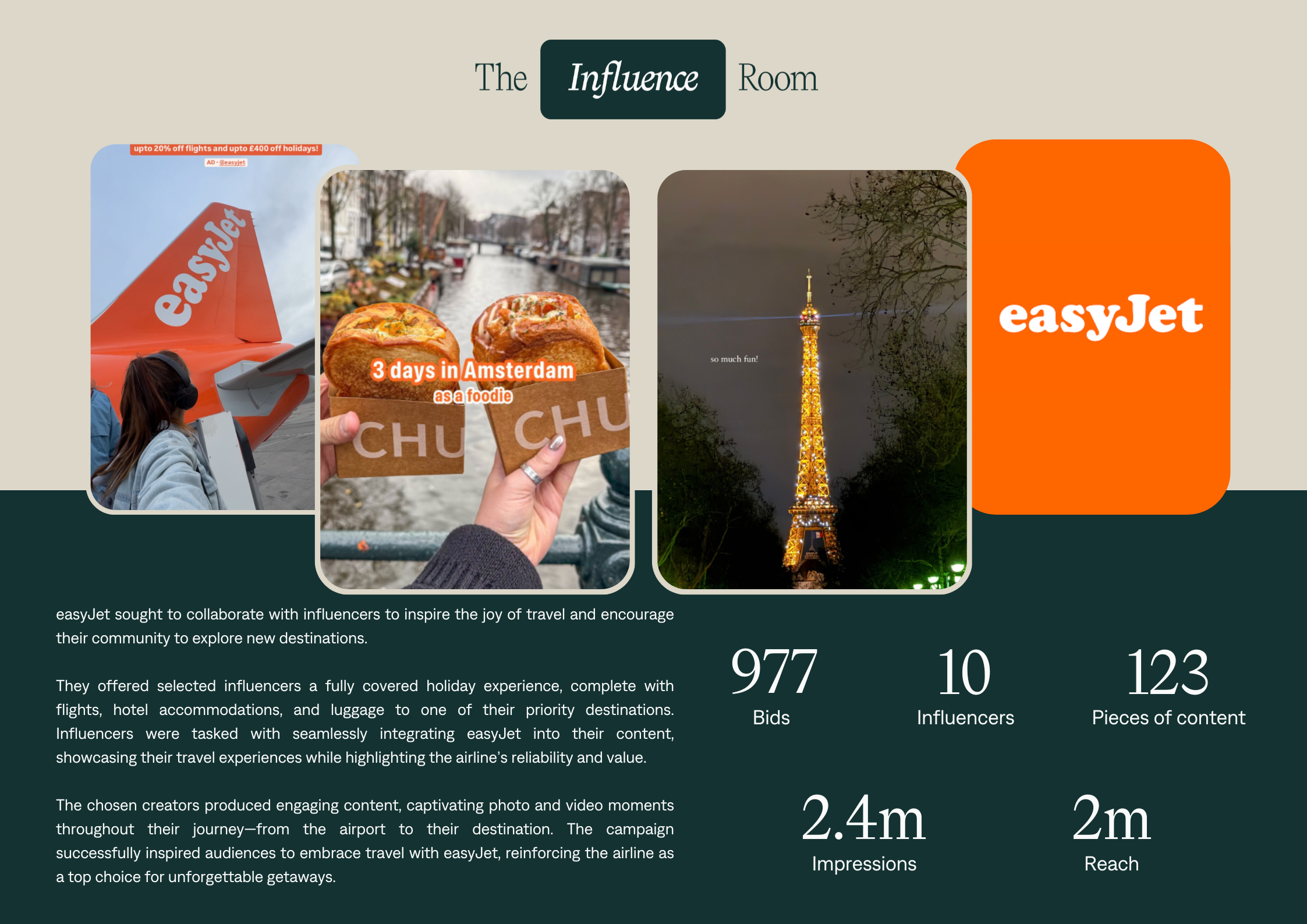UGC Creators: The Secret to Seeing Your Brand Grow
Here’s the thing, brand marketing isn’t exactly a walk in the park right now.
Algorithms are changing faster than the British weather, attention spans are shorter than a TikTok video, and consumers can spot a generic ad from a mile away.
So, how do you actually connect with your audience? That’s where UGC comes in.
This piece dives into what user-generated content is all about, who’s behind it, and why your brand might just want to get on board.
What Is a UGC Creator?
Alright, let’s start with the basics:
UGC stands for User-Generated Content, which, in a brand context, means content that looks and feels like it came from a real customer.
The key difference? UGC creators aren’t necessarily promoting your product on their social profiles. Instead, they’re creating branded content for you to use across your marketing channels.
Think of them as the love child of a talented videographer and a trusted customer.
They produce raw-but-relatable videos, aesthetic product shots, testimonials that don’t sound scripted, and day-in-the-life clips that feel way more “mate recommending something in the group chat” than “corporate campaign.”
Wait, So They’re Not Influencers?
Nope. And that’s what sets them apart.
Influencers are hired to speak to their audience. UGC content creators are hired to create content that you can use to speak to yours.
They don’t rely on follower counts or engagement rates. They rely on storytelling skills, creative chops, and a knack for making things feel natural.
They’re not the stars. Your brand is.
Why Should Brands Care About UGC Creators?
You’ve got your internal team, some slick campaigns brewing, and maybe even a few influencer partnerships in the pipeline, so why not throw UGC creators into the mix?
“UGC creators give brands a reusable bank of content for their socials and marketing. They’re easier to brief, since they don’t need to post on their channels,” says Immy Conoley, Senior Customer Success Executive at The Influence Room.
Here’s the scoop:
1. Authenticity Wins (Every. Single. Time.)
The truth is that we all crave authenticity.
Your audience is more likely to trust a relatable person sharing a genuine opinion than a polished ad with fancy lighting and a massive production budget.
UGC creators bring that raw, unfiltered vibe. It feels human. It feels trustworthy. And most importantly, it feels believable.
2. It Performs
This isn’t just a passing trend.
UGC consistently outshines traditional branded content when it comes to engagement, click-through rates, and conversions.
Why? It doesn’t come off as an ad. That scroll-stopping authenticity drives real results. That’s the magic.
As Immy mentioned, “UGC creators that have clear backgrounds, have nailed the product focus with nice lighting, and provide different shots with different angles. Content is more about the product than it is the influencer.”
3. Budget-Friendly, Big Impact
Influencer campaigns and studio shoots can quickly eat up your marketing budget.
But what about UGC creators? They deliver high-impact content at a fraction of the cost. Typically, UGC is associated with micro-influencers.
Many even work on a per-deliverable or package basis, making it easier for brands (especially startups or challengers) to scale without breaking the bank.
How Brands Can Leverage UGC Creators
Here’s how brands can make the most of UGC creators. UGC content creators aren’t just for TikTok. They’re a whole goldmine of assets for your entire marketing ecosystem.
Types of Content They Can Create:
- Product demos & unboxings
Perfect for showing off features without sounding like a sales pitch. - Testimonials & reviews
Social proof that doesn’t feel like it was written by a copywriter. - Day-in-the-life or routine content
People want to see how your product fits into real life, and this does just that. - Aesthetic lifestyle content
Still want it to look great on the grid? UGC creators can give you those Instagram-ready visuals with a genuine feel.
Where You Can Use It:
- Paid ads (Meta, TikTok, YouTube Shorts)
UGC outperforms traditional creatives in most paid ad tests. - Organic social content
Fills the content calendar without feeling repetitive or overly polished. - Email marketing
Incorporating short videos or quotes from UGC creators can bring authenticity to your communications. - Website & product pages
Including trustworthy testimonials or real-life product demonstrations can significantly boost your conversion rates. - In-store digital displays
Never overlook the impact of content driven by peers in physical retail environments.
Where to Find UGC Creators (Without Overcomplicating It)
Finding creators doesn’t have to be a grind. Here’s where to look, and how to know who’s worth your time.
- Creator Platforms (like The Influence Room)
Want creators that understand your niche and brand vibe? These platforms are built to connect you with the right fit for any campaign. - Freelancer Marketplaces
Sites like Fiverr and Upwork are full of UGC creators ready to go. Browse their work, test a few out, and see who clicks. - Creator Communities
TikTok comments, X threads, and Facebook groups are full of creators showing off their stuff. It’s a great way to spot up-and-comers. - Agencies That Do It All
If you’d rather hand it over, UGC-focused agencies take care of the whole thing — from finding talent to final edits. - Start Small, Then Scale
Kick off with a short brief. Give creators room to be creative. If it lands, great — now you know who to invest in.
UGC in Action: Real Brand Wins
Let’s bring it to life with some homegrown heroes who nailed UGC with The Influence Room.
Barry M: Show Us Your Party Look!

Barry M turned up the volume on their seasonal glam with a UGC campaign that practically screamed sparkle.
Teaming up with just eleven UGC creators, they invited people to show off their boldest party looks using Barry M products.
Glitter, gloss, and glam galore.
The result? 74,000 impressions, 65,000 reach, and a wave of vibrant content that felt fun, authentic, and shareable. When your community is buzzing, your brand truly shines.
Holland & Barrett: A Cosy Autumn Night In

Holland & Barrett Went Full Cosy for Autumn.
Instead of pushing products, they teamed up with UGC creators to capture that warm, wind-down feeling — think herbal teas, candles, and all things self-care.
The content beautifully captured those snug moments we all long for. The results were impressive: 1.7 million impressions, 895,000 views, and a reach of 1.4 million.
This demonstrates that authentic, lifestyle-driven content resonates much more than a polished product shot ever could.
La Redoute: Valentine’s Day Ready

Let’s dive into what La Redoute has to say about Valentine’s Day. Instead of the usual staged bouquets and tired clichés, they’ve opted for a refreshingly authentic approach that really stands out.
By teaming up with UGC content creators, they provided outfit inspiration, dreamy home decor ideas, and relaxed gift suggestions.
The campaign was effortlessly chic and relatable. The results? 1.1 million impressions, 928,000 reach, and 684,000 views.
It seems audiences are drawn to content that feels both aspirational and attainable.
The UGC market is constantly evolving, with the roles of its creators expanding. Immy noted:
“In my current experience, brands are becoming less focused on reach and more focused on user-generated assets, as they come at a much lower cost than hiring a photographer.
There’s a growing need for brands to secure rights across content posted with campaigns, as they want to reuse everything as much as possible.”
Getting Started With UGC Creators
Ready to start working with UGC Creators? Here are the steps to get started:
Step 1: Set Goals
Decide if you are looking for engagement in a community, conversions, or increasing brand awareness. Have an idea of what success looks like through the eyes of your brand and what you want to achieve.
Step 2: Write a Comprehensive Brief
It is important to keep things simple but be specific enough. Include a clear tone of voice to communicate how the brand talks, their key message, and what to or not to include, as well as usage rights.
Step 3: Get the Usage Rights
Make sure you talk to the UGC creator about where their content is being used and how you intend to use it.
Step 4: Get a Roster of Creators
If the UGC creators delivered content you liked, keep them in rotation. Creating a long-term bond will help create content that is much more aligned to your brands and their goals.
Step 5: Measure Performance
Stop guessing!! Test, track the ad metrics, and your engagement data. And then see if those are working and producing the best results.
FAQs
What does the UGC stand for?
UGC stands for user-generated content. This is any kind of content - like text, images, videos, or reviews - that’s created and shared by regular users, not the brand itself.
What is a UGC creator?
A UGC creator is someone who makes content like videos, pictures, or social posts that look and feel like real, everyday content. It’s made to feel authentic and relatable, and brands usually use it in their own marketing.
What is an example of UGC content?
User-generated content can take many forms, including:
- Customer reviews on products or services
- Photos or videos shared by users featuring a brand or product
- Unboxing videos created by real customers
- Social media posts that tag or mention a brand
- Testimonials shared on websites or review platforms
- Blog posts written by users about their experience with a product
These types of content are created by real users and help build trust and authenticity for brands.
How do I get UGC content?
To get UGC, you can:
- Ask your followers to share photos or videos using a specific hashtag
- Run a fun contest or giveaway to get people posting
- Team up with influencers or creators who can help spread the word
Just make it easy and fun for people to share their own content about your brand!
What is UGC for TikTok?
On TikTok, UGC (user-generated content) is content like videos, pics, reviews, or testimonials made by everyday people, not brands, sharing their real experiences with a product or brand.
Final Thoughts
User-generated content creators aren’t just a flickering trend; they represent the future of authentic, engaging brand storytelling.
They enable your brand to stand out amidst the chaos, forge genuine connections with audiences, and appear in feeds in a way that doesn’t come off as just another advertisement. And in today’s content-heavy world, that’s priceless.
So, if you’re ready to create content that people actually want to watch, it might just be time to give UGC creators a seat at the table.
Ready to tap into UGC?
Elevate your brand and book a demo with The Influence Room today and discover how real creators can transform your content strategy.


